Comparing Action Research and Grounded Theory Methodologies
VerifiedAdded on 2023/06/04
|9
|1908
|134
Report
AI Summary
This report provides a comprehensive comparison of two qualitative research methodologies: action research and grounded theory. It begins by outlining the epistemological foundations, key elements, and methods employed in each approach. The report then delves into a detailed comparison, highlighting similarities and differences, advantages, and disadvantages of each paradigm. It also explores the types of research questions best suited for each methodology. The study then provides a brief discussion of a potential research topic and justifies the selection of a preferred theoretical approach. The report concludes with a discussion of the management of HIV and AIDS and how action research could be applied to address the spread of the disease. The report covers data collection methods, including the use of previous data, interviews, questionnaires, and peer discussions. The study highlights the strengths of action research, such as its systematic approach, issue analysis, and collaborative nature, while also acknowledging limitations, such as the scope of focus and potential subject reluctance.

Running Head: RESEARCH METHODOLOGIES 1
Research Methodologies
Name
Institution
Research Methodologies
Name
Institution
Paraphrase This Document
Need a fresh take? Get an instant paraphrase of this document with our AI Paraphraser
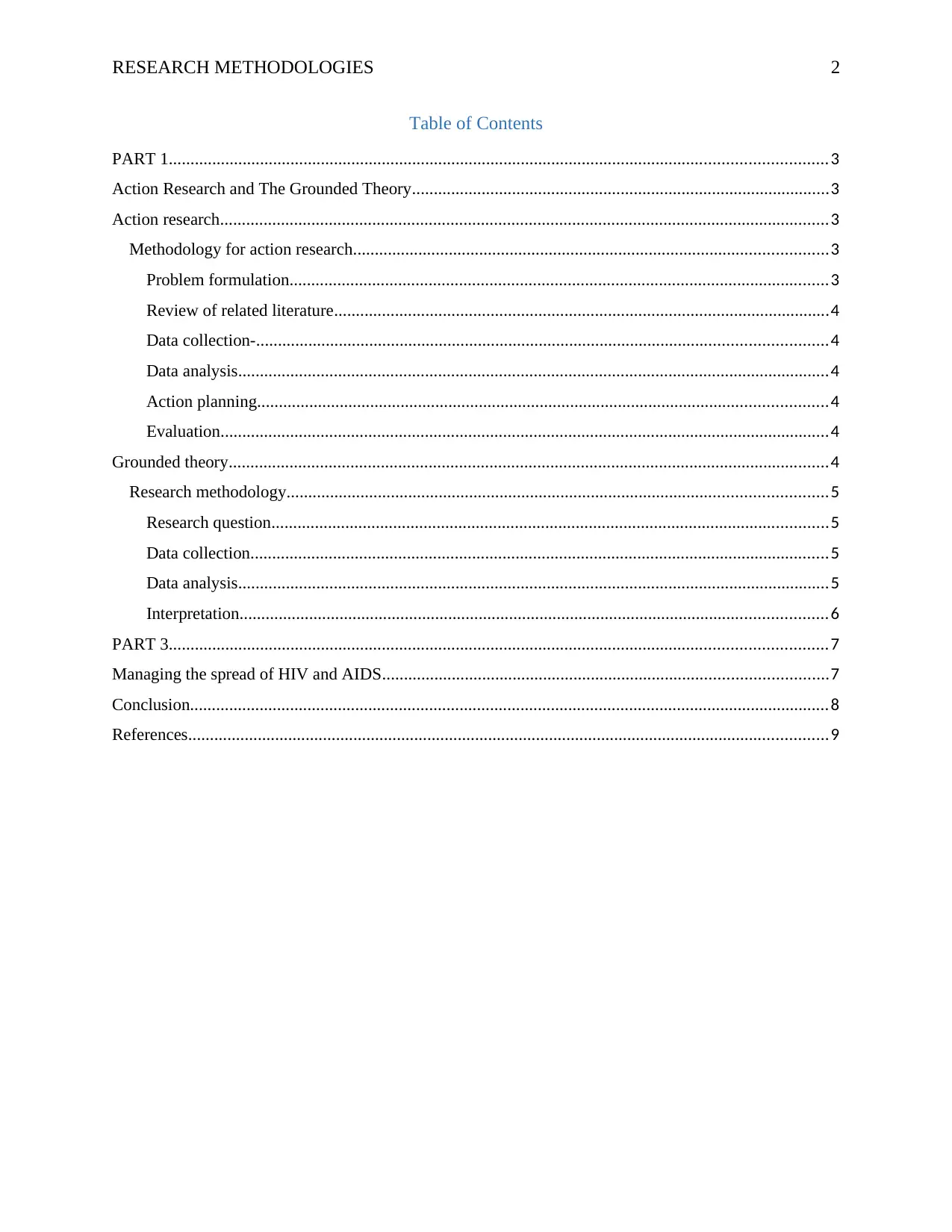
RESEARCH METHODOLOGIES 2
Table of Contents
PART 1.......................................................................................................................................................3
Action Research and The Grounded Theory................................................................................................3
Action research............................................................................................................................................3
Methodology for action research.............................................................................................................3
Problem formulation............................................................................................................................3
Review of related literature..................................................................................................................4
Data collection-...................................................................................................................................4
Data analysis........................................................................................................................................4
Action planning...................................................................................................................................4
Evaluation............................................................................................................................................4
Grounded theory..........................................................................................................................................4
Research methodology............................................................................................................................5
Research question................................................................................................................................5
Data collection.....................................................................................................................................5
Data analysis........................................................................................................................................5
Interpretation.......................................................................................................................................6
PART 3.......................................................................................................................................................7
Managing the spread of HIV and AIDS......................................................................................................7
Conclusion...................................................................................................................................................8
References...................................................................................................................................................9
Table of Contents
PART 1.......................................................................................................................................................3
Action Research and The Grounded Theory................................................................................................3
Action research............................................................................................................................................3
Methodology for action research.............................................................................................................3
Problem formulation............................................................................................................................3
Review of related literature..................................................................................................................4
Data collection-...................................................................................................................................4
Data analysis........................................................................................................................................4
Action planning...................................................................................................................................4
Evaluation............................................................................................................................................4
Grounded theory..........................................................................................................................................4
Research methodology............................................................................................................................5
Research question................................................................................................................................5
Data collection.....................................................................................................................................5
Data analysis........................................................................................................................................5
Interpretation.......................................................................................................................................6
PART 3.......................................................................................................................................................7
Managing the spread of HIV and AIDS......................................................................................................7
Conclusion...................................................................................................................................................8
References...................................................................................................................................................9
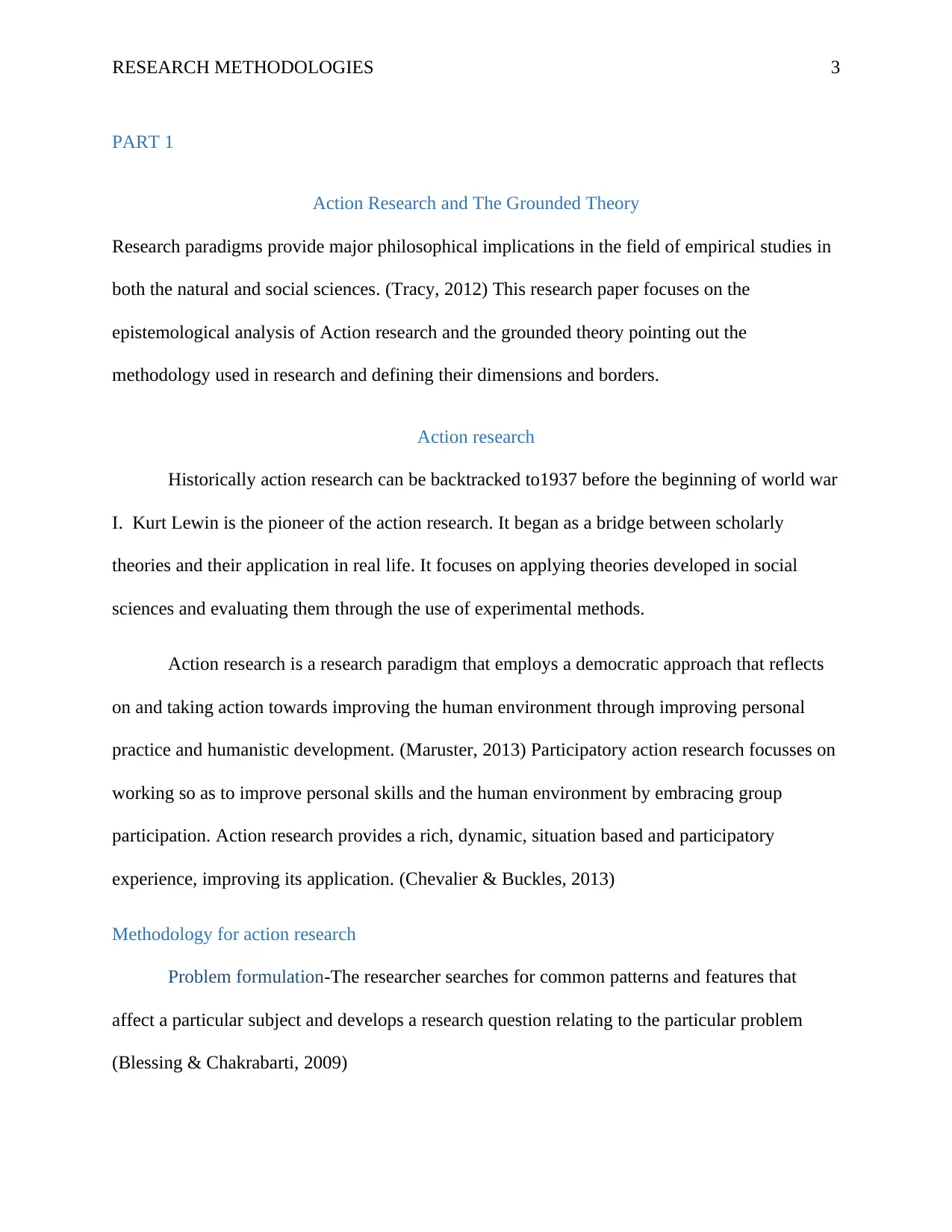
RESEARCH METHODOLOGIES 3
PART 1
Action Research and The Grounded Theory
Research paradigms provide major philosophical implications in the field of empirical studies in
both the natural and social sciences. (Tracy, 2012) This research paper focuses on the
epistemological analysis of Action research and the grounded theory pointing out the
methodology used in research and defining their dimensions and borders.
Action research
Historically action research can be backtracked to1937 before the beginning of world war
I. Kurt Lewin is the pioneer of the action research. It began as a bridge between scholarly
theories and their application in real life. It focuses on applying theories developed in social
sciences and evaluating them through the use of experimental methods.
Action research is a research paradigm that employs a democratic approach that reflects
on and taking action towards improving the human environment through improving personal
practice and humanistic development. (Maruster, 2013) Participatory action research focusses on
working so as to improve personal skills and the human environment by embracing group
participation. Action research provides a rich, dynamic, situation based and participatory
experience, improving its application. (Chevalier & Buckles, 2013)
Methodology for action research
Problem formulation-The researcher searches for common patterns and features that
affect a particular subject and develops a research question relating to the particular problem
(Blessing & Chakrabarti, 2009)
PART 1
Action Research and The Grounded Theory
Research paradigms provide major philosophical implications in the field of empirical studies in
both the natural and social sciences. (Tracy, 2012) This research paper focuses on the
epistemological analysis of Action research and the grounded theory pointing out the
methodology used in research and defining their dimensions and borders.
Action research
Historically action research can be backtracked to1937 before the beginning of world war
I. Kurt Lewin is the pioneer of the action research. It began as a bridge between scholarly
theories and their application in real life. It focuses on applying theories developed in social
sciences and evaluating them through the use of experimental methods.
Action research is a research paradigm that employs a democratic approach that reflects
on and taking action towards improving the human environment through improving personal
practice and humanistic development. (Maruster, 2013) Participatory action research focusses on
working so as to improve personal skills and the human environment by embracing group
participation. Action research provides a rich, dynamic, situation based and participatory
experience, improving its application. (Chevalier & Buckles, 2013)
Methodology for action research
Problem formulation-The researcher searches for common patterns and features that
affect a particular subject and develops a research question relating to the particular problem
(Blessing & Chakrabarti, 2009)
⊘ This is a preview!⊘
Do you want full access?
Subscribe today to unlock all pages.

Trusted by 1+ million students worldwide
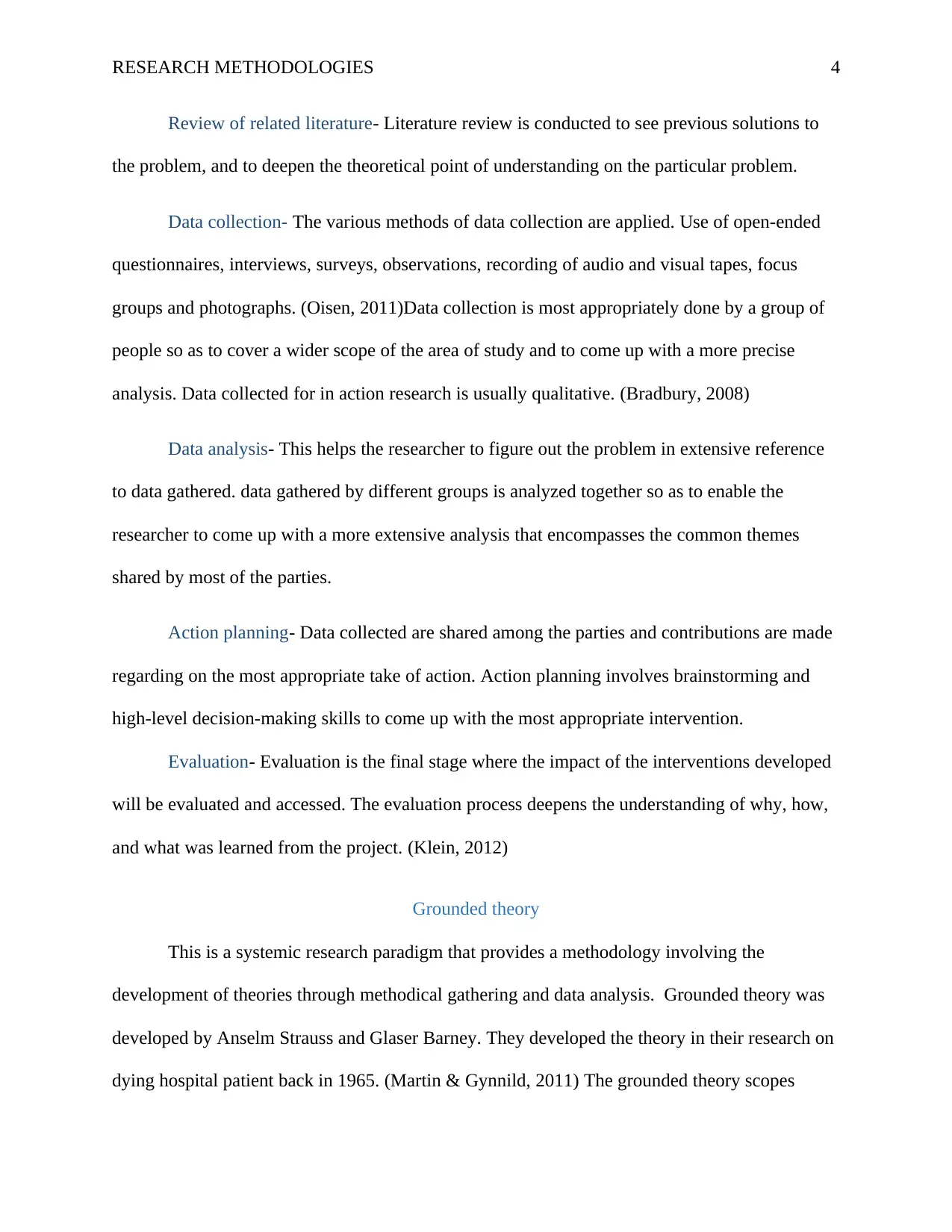
RESEARCH METHODOLOGIES 4
Review of related literature- Literature review is conducted to see previous solutions to
the problem, and to deepen the theoretical point of understanding on the particular problem.
Data collection- The various methods of data collection are applied. Use of open-ended
questionnaires, interviews, surveys, observations, recording of audio and visual tapes, focus
groups and photographs. (Oisen, 2011)Data collection is most appropriately done by a group of
people so as to cover a wider scope of the area of study and to come up with a more precise
analysis. Data collected for in action research is usually qualitative. (Bradbury, 2008)
Data analysis- This helps the researcher to figure out the problem in extensive reference
to data gathered. data gathered by different groups is analyzed together so as to enable the
researcher to come up with a more extensive analysis that encompasses the common themes
shared by most of the parties.
Action planning- Data collected are shared among the parties and contributions are made
regarding on the most appropriate take of action. Action planning involves brainstorming and
high-level decision-making skills to come up with the most appropriate intervention.
Evaluation- Evaluation is the final stage where the impact of the interventions developed
will be evaluated and accessed. The evaluation process deepens the understanding of why, how,
and what was learned from the project. (Klein, 2012)
Grounded theory
This is a systemic research paradigm that provides a methodology involving the
development of theories through methodical gathering and data analysis. Grounded theory was
developed by Anselm Strauss and Glaser Barney. They developed the theory in their research on
dying hospital patient back in 1965. (Martin & Gynnild, 2011) The grounded theory scopes
Review of related literature- Literature review is conducted to see previous solutions to
the problem, and to deepen the theoretical point of understanding on the particular problem.
Data collection- The various methods of data collection are applied. Use of open-ended
questionnaires, interviews, surveys, observations, recording of audio and visual tapes, focus
groups and photographs. (Oisen, 2011)Data collection is most appropriately done by a group of
people so as to cover a wider scope of the area of study and to come up with a more precise
analysis. Data collected for in action research is usually qualitative. (Bradbury, 2008)
Data analysis- This helps the researcher to figure out the problem in extensive reference
to data gathered. data gathered by different groups is analyzed together so as to enable the
researcher to come up with a more extensive analysis that encompasses the common themes
shared by most of the parties.
Action planning- Data collected are shared among the parties and contributions are made
regarding on the most appropriate take of action. Action planning involves brainstorming and
high-level decision-making skills to come up with the most appropriate intervention.
Evaluation- Evaluation is the final stage where the impact of the interventions developed
will be evaluated and accessed. The evaluation process deepens the understanding of why, how,
and what was learned from the project. (Klein, 2012)
Grounded theory
This is a systemic research paradigm that provides a methodology involving the
development of theories through methodical gathering and data analysis. Grounded theory was
developed by Anselm Strauss and Glaser Barney. They developed the theory in their research on
dying hospital patient back in 1965. (Martin & Gynnild, 2011) The grounded theory scopes
Paraphrase This Document
Need a fresh take? Get an instant paraphrase of this document with our AI Paraphraser
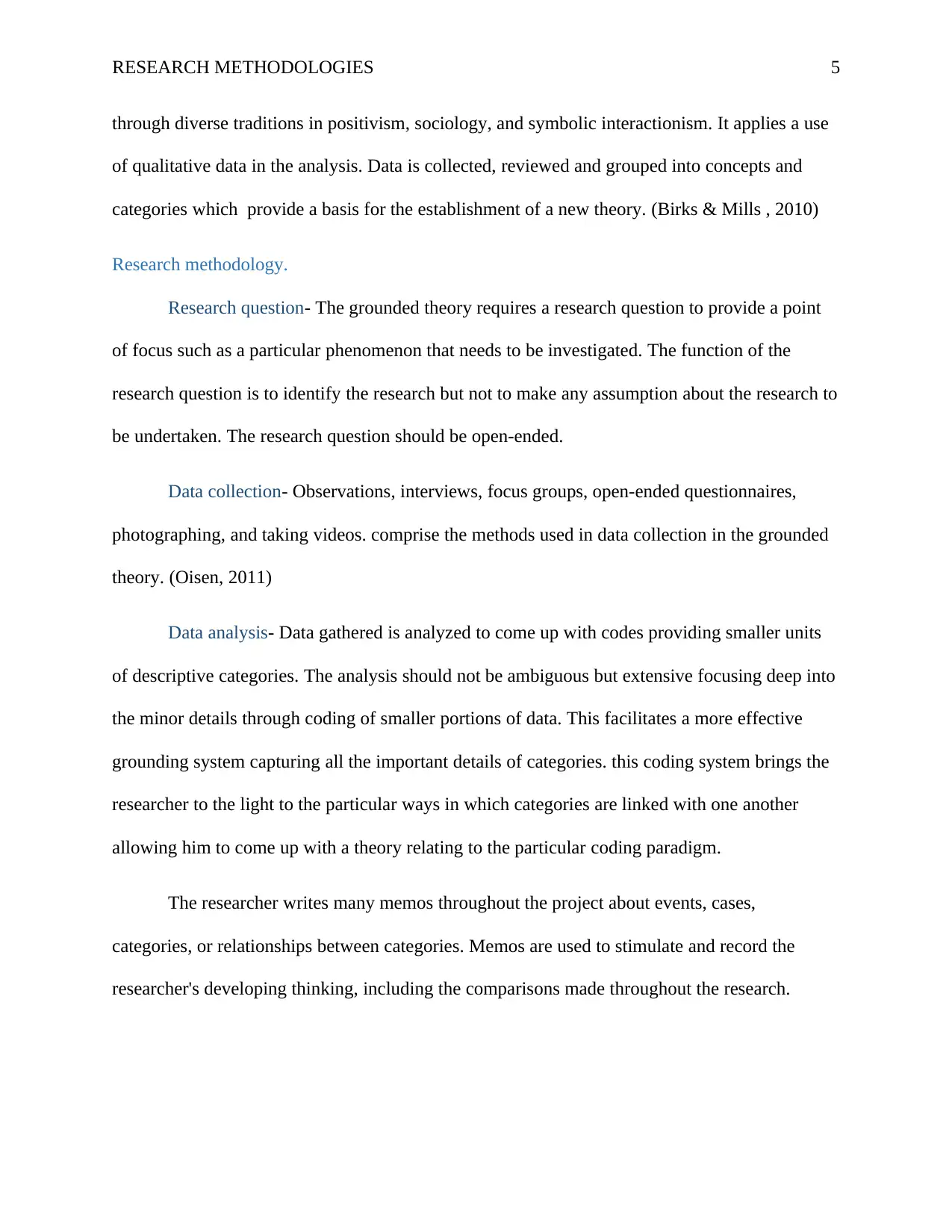
RESEARCH METHODOLOGIES 5
through diverse traditions in positivism, sociology, and symbolic interactionism. It applies a use
of qualitative data in the analysis. Data is collected, reviewed and grouped into concepts and
categories which provide a basis for the establishment of a new theory. (Birks & Mills , 2010)
Research methodology.
Research question- The grounded theory requires a research question to provide a point
of focus such as a particular phenomenon that needs to be investigated. The function of the
research question is to identify the research but not to make any assumption about the research to
be undertaken. The research question should be open-ended.
Data collection- Observations, interviews, focus groups, open-ended questionnaires,
photographing, and taking videos. comprise the methods used in data collection in the grounded
theory. (Oisen, 2011)
Data analysis- Data gathered is analyzed to come up with codes providing smaller units
of descriptive categories. The analysis should not be ambiguous but extensive focusing deep into
the minor details through coding of smaller portions of data. This facilitates a more effective
grounding system capturing all the important details of categories. this coding system brings the
researcher to the light to the particular ways in which categories are linked with one another
allowing him to come up with a theory relating to the particular coding paradigm.
The researcher writes many memos throughout the project about events, cases,
categories, or relationships between categories. Memos are used to stimulate and record the
researcher's developing thinking, including the comparisons made throughout the research.
through diverse traditions in positivism, sociology, and symbolic interactionism. It applies a use
of qualitative data in the analysis. Data is collected, reviewed and grouped into concepts and
categories which provide a basis for the establishment of a new theory. (Birks & Mills , 2010)
Research methodology.
Research question- The grounded theory requires a research question to provide a point
of focus such as a particular phenomenon that needs to be investigated. The function of the
research question is to identify the research but not to make any assumption about the research to
be undertaken. The research question should be open-ended.
Data collection- Observations, interviews, focus groups, open-ended questionnaires,
photographing, and taking videos. comprise the methods used in data collection in the grounded
theory. (Oisen, 2011)
Data analysis- Data gathered is analyzed to come up with codes providing smaller units
of descriptive categories. The analysis should not be ambiguous but extensive focusing deep into
the minor details through coding of smaller portions of data. This facilitates a more effective
grounding system capturing all the important details of categories. this coding system brings the
researcher to the light to the particular ways in which categories are linked with one another
allowing him to come up with a theory relating to the particular coding paradigm.
The researcher writes many memos throughout the project about events, cases,
categories, or relationships between categories. Memos are used to stimulate and record the
researcher's developing thinking, including the comparisons made throughout the research.
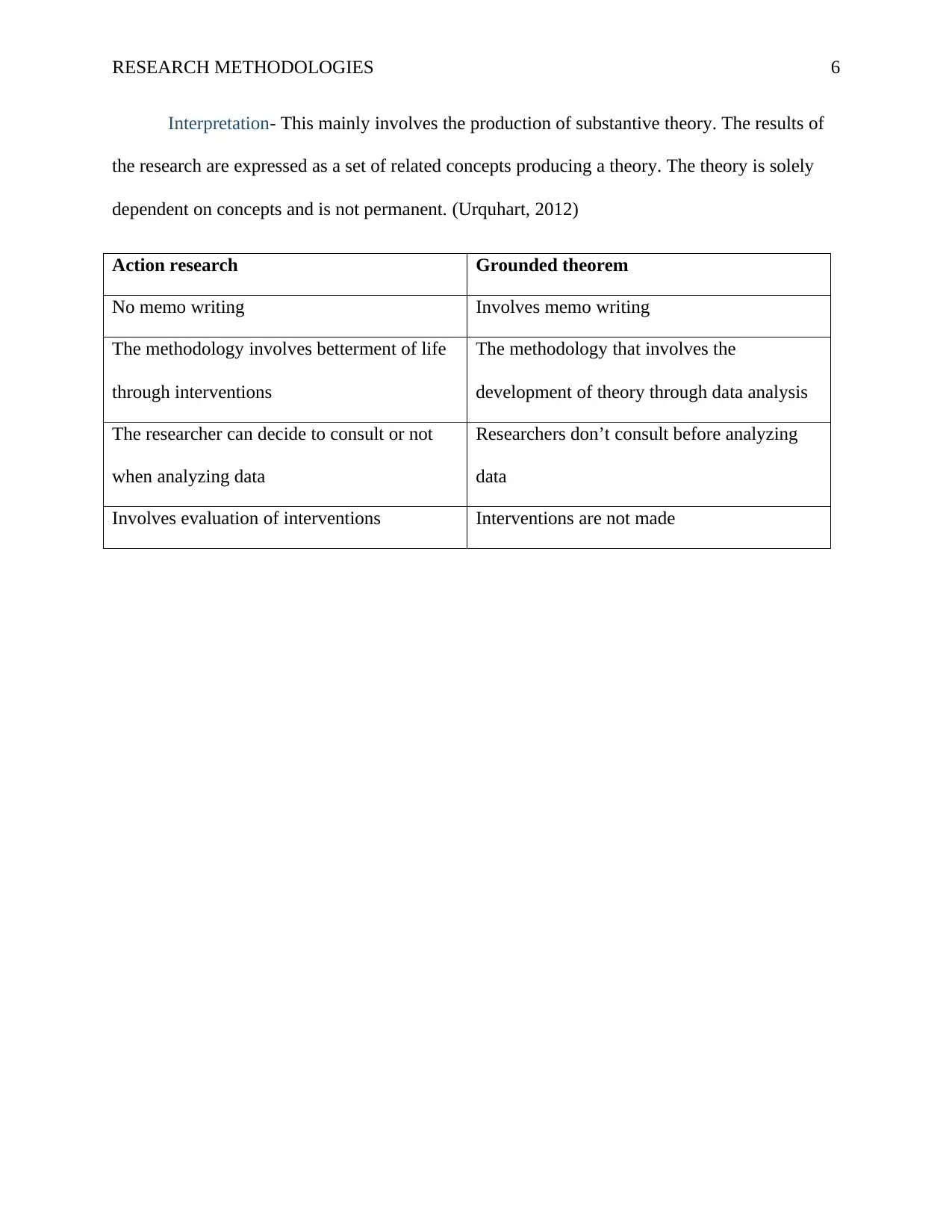
RESEARCH METHODOLOGIES 6
Interpretation- This mainly involves the production of substantive theory. The results of
the research are expressed as a set of related concepts producing a theory. The theory is solely
dependent on concepts and is not permanent. (Urquhart, 2012)
Action research Grounded theorem
No memo writing Involves memo writing
The methodology involves betterment of life
through interventions
The methodology that involves the
development of theory through data analysis
The researcher can decide to consult or not
when analyzing data
Researchers don’t consult before analyzing
data
Involves evaluation of interventions Interventions are not made
Interpretation- This mainly involves the production of substantive theory. The results of
the research are expressed as a set of related concepts producing a theory. The theory is solely
dependent on concepts and is not permanent. (Urquhart, 2012)
Action research Grounded theorem
No memo writing Involves memo writing
The methodology involves betterment of life
through interventions
The methodology that involves the
development of theory through data analysis
The researcher can decide to consult or not
when analyzing data
Researchers don’t consult before analyzing
data
Involves evaluation of interventions Interventions are not made
⊘ This is a preview!⊘
Do you want full access?
Subscribe today to unlock all pages.

Trusted by 1+ million students worldwide
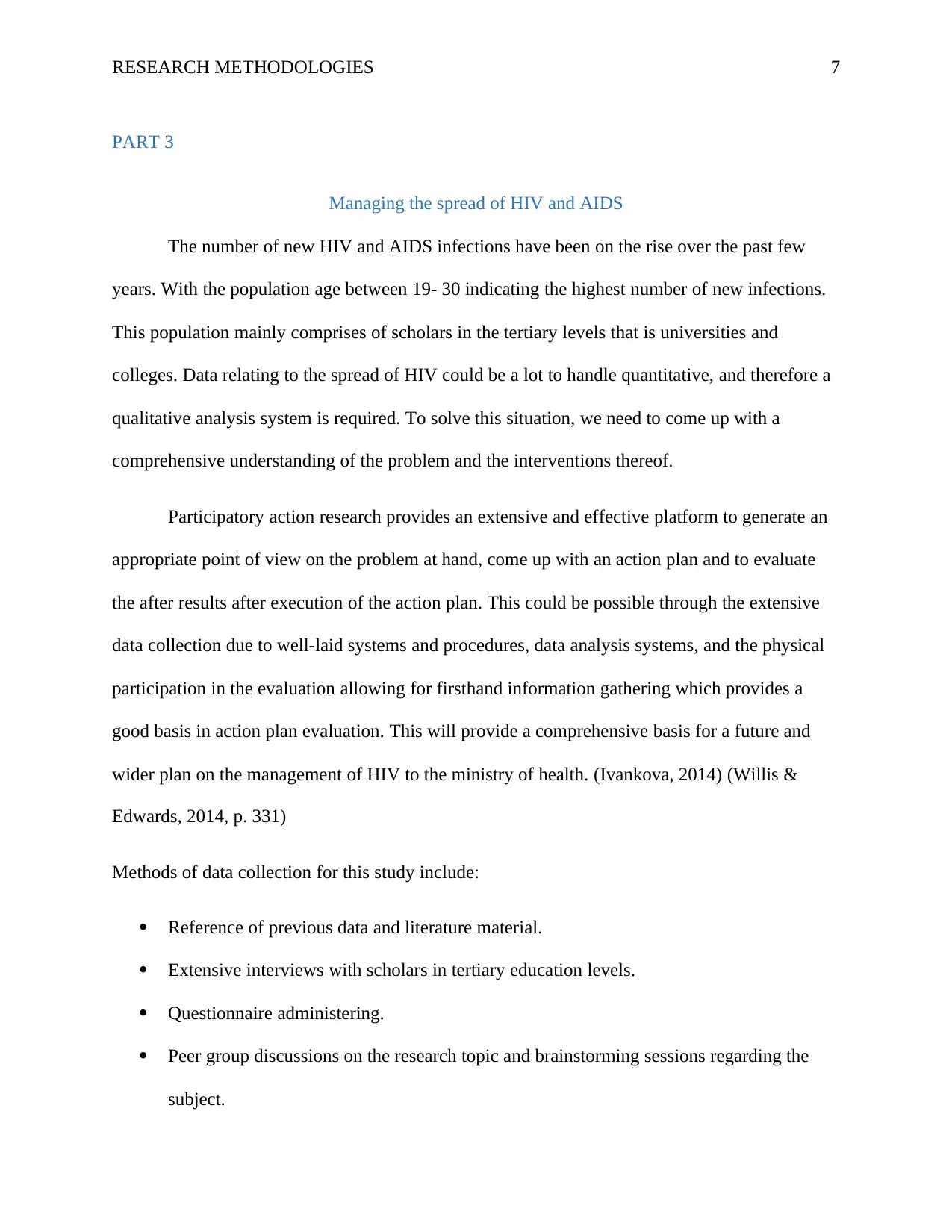
RESEARCH METHODOLOGIES 7
PART 3
Managing the spread of HIV and AIDS
The number of new HIV and AIDS infections have been on the rise over the past few
years. With the population age between 19- 30 indicating the highest number of new infections.
This population mainly comprises of scholars in the tertiary levels that is universities and
colleges. Data relating to the spread of HIV could be a lot to handle quantitative, and therefore a
qualitative analysis system is required. To solve this situation, we need to come up with a
comprehensive understanding of the problem and the interventions thereof.
Participatory action research provides an extensive and effective platform to generate an
appropriate point of view on the problem at hand, come up with an action plan and to evaluate
the after results after execution of the action plan. This could be possible through the extensive
data collection due to well-laid systems and procedures, data analysis systems, and the physical
participation in the evaluation allowing for firsthand information gathering which provides a
good basis in action plan evaluation. This will provide a comprehensive basis for a future and
wider plan on the management of HIV to the ministry of health. (Ivankova, 2014) (Willis &
Edwards, 2014, p. 331)
Methods of data collection for this study include:
Reference of previous data and literature material.
Extensive interviews with scholars in tertiary education levels.
Questionnaire administering.
Peer group discussions on the research topic and brainstorming sessions regarding the
subject.
PART 3
Managing the spread of HIV and AIDS
The number of new HIV and AIDS infections have been on the rise over the past few
years. With the population age between 19- 30 indicating the highest number of new infections.
This population mainly comprises of scholars in the tertiary levels that is universities and
colleges. Data relating to the spread of HIV could be a lot to handle quantitative, and therefore a
qualitative analysis system is required. To solve this situation, we need to come up with a
comprehensive understanding of the problem and the interventions thereof.
Participatory action research provides an extensive and effective platform to generate an
appropriate point of view on the problem at hand, come up with an action plan and to evaluate
the after results after execution of the action plan. This could be possible through the extensive
data collection due to well-laid systems and procedures, data analysis systems, and the physical
participation in the evaluation allowing for firsthand information gathering which provides a
good basis in action plan evaluation. This will provide a comprehensive basis for a future and
wider plan on the management of HIV to the ministry of health. (Ivankova, 2014) (Willis &
Edwards, 2014, p. 331)
Methods of data collection for this study include:
Reference of previous data and literature material.
Extensive interviews with scholars in tertiary education levels.
Questionnaire administering.
Peer group discussions on the research topic and brainstorming sessions regarding the
subject.
Paraphrase This Document
Need a fresh take? Get an instant paraphrase of this document with our AI Paraphraser
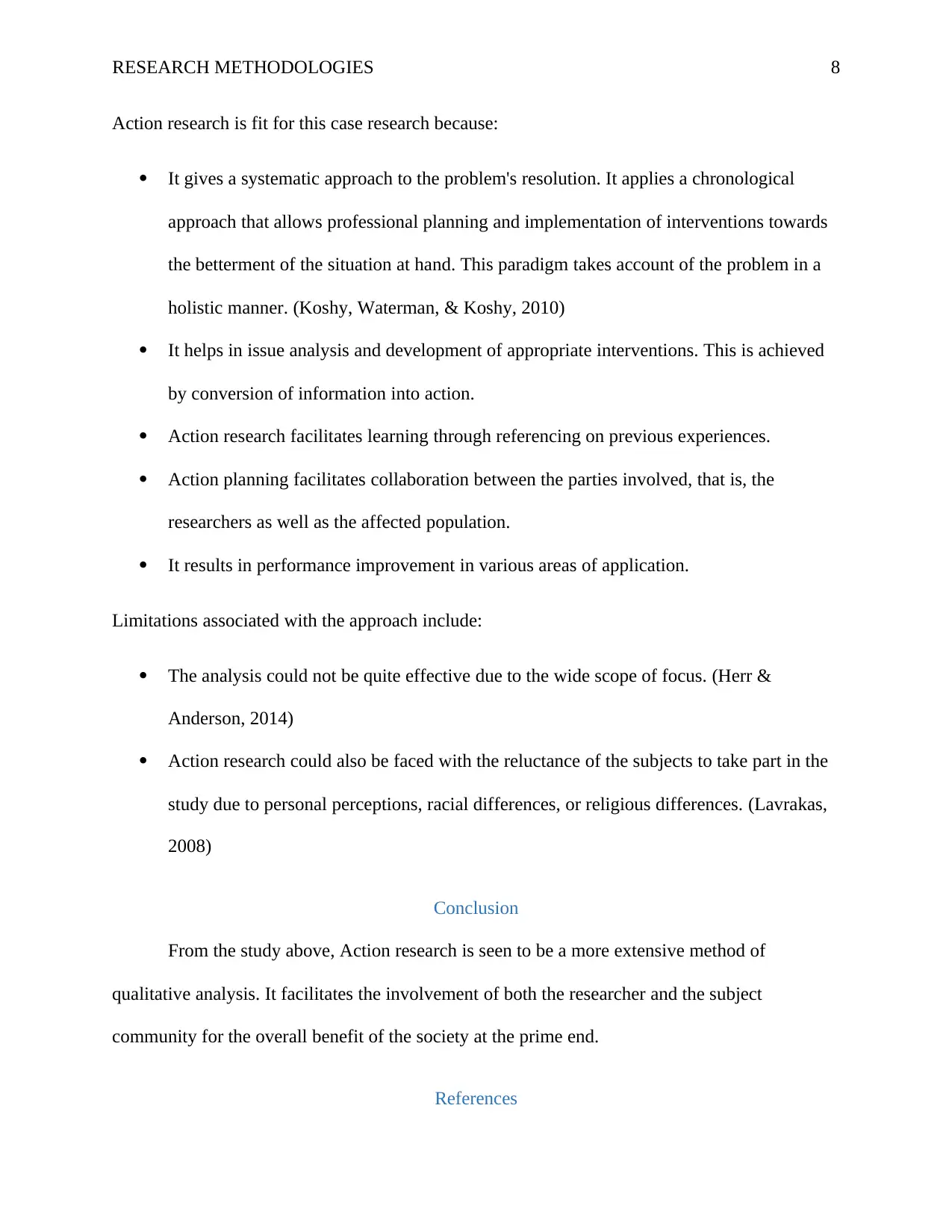
RESEARCH METHODOLOGIES 8
Action research is fit for this case research because:
It gives a systematic approach to the problem's resolution. It applies a chronological
approach that allows professional planning and implementation of interventions towards
the betterment of the situation at hand. This paradigm takes account of the problem in a
holistic manner. (Koshy, Waterman, & Koshy, 2010)
It helps in issue analysis and development of appropriate interventions. This is achieved
by conversion of information into action.
Action research facilitates learning through referencing on previous experiences.
Action planning facilitates collaboration between the parties involved, that is, the
researchers as well as the affected population.
It results in performance improvement in various areas of application.
Limitations associated with the approach include:
The analysis could not be quite effective due to the wide scope of focus. (Herr &
Anderson, 2014)
Action research could also be faced with the reluctance of the subjects to take part in the
study due to personal perceptions, racial differences, or religious differences. (Lavrakas,
2008)
Conclusion
From the study above, Action research is seen to be a more extensive method of
qualitative analysis. It facilitates the involvement of both the researcher and the subject
community for the overall benefit of the society at the prime end.
References
Action research is fit for this case research because:
It gives a systematic approach to the problem's resolution. It applies a chronological
approach that allows professional planning and implementation of interventions towards
the betterment of the situation at hand. This paradigm takes account of the problem in a
holistic manner. (Koshy, Waterman, & Koshy, 2010)
It helps in issue analysis and development of appropriate interventions. This is achieved
by conversion of information into action.
Action research facilitates learning through referencing on previous experiences.
Action planning facilitates collaboration between the parties involved, that is, the
researchers as well as the affected population.
It results in performance improvement in various areas of application.
Limitations associated with the approach include:
The analysis could not be quite effective due to the wide scope of focus. (Herr &
Anderson, 2014)
Action research could also be faced with the reluctance of the subjects to take part in the
study due to personal perceptions, racial differences, or religious differences. (Lavrakas,
2008)
Conclusion
From the study above, Action research is seen to be a more extensive method of
qualitative analysis. It facilitates the involvement of both the researcher and the subject
community for the overall benefit of the society at the prime end.
References
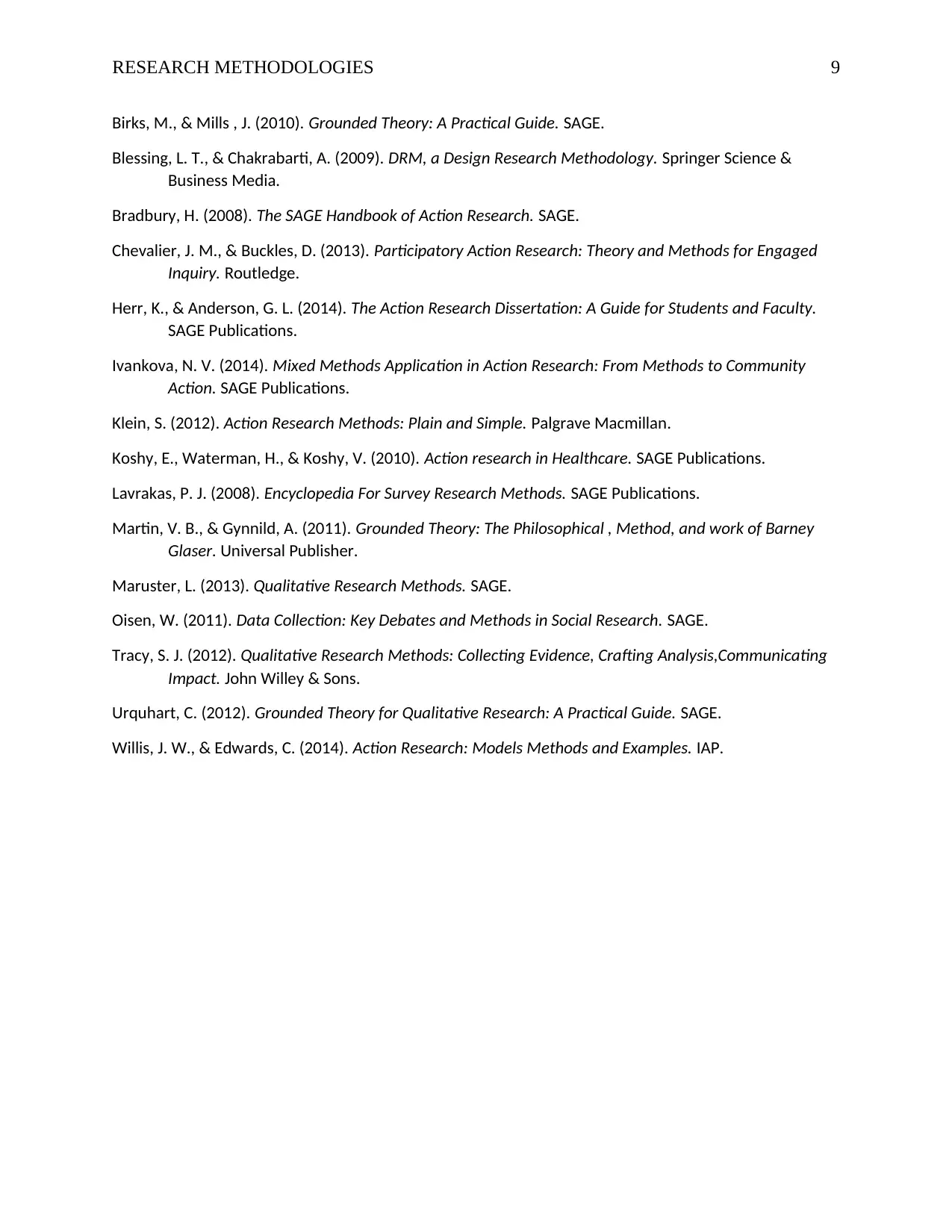
RESEARCH METHODOLOGIES 9
Birks, M., & Mills , J. (2010). Grounded Theory: A Practical Guide. SAGE.
Blessing, L. T., & Chakrabarti, A. (2009). DRM, a Design Research Methodology. Springer Science &
Business Media.
Bradbury, H. (2008). The SAGE Handbook of Action Research. SAGE.
Chevalier, J. M., & Buckles, D. (2013). Participatory Action Research: Theory and Methods for Engaged
Inquiry. Routledge.
Herr, K., & Anderson, G. L. (2014). The Action Research Dissertation: A Guide for Students and Faculty.
SAGE Publications.
Ivankova, N. V. (2014). Mixed Methods Application in Action Research: From Methods to Community
Action. SAGE Publications.
Klein, S. (2012). Action Research Methods: Plain and Simple. Palgrave Macmillan.
Koshy, E., Waterman, H., & Koshy, V. (2010). Action research in Healthcare. SAGE Publications.
Lavrakas, P. J. (2008). Encyclopedia For Survey Research Methods. SAGE Publications.
Martin, V. B., & Gynnild, A. (2011). Grounded Theory: The Philosophical , Method, and work of Barney
Glaser. Universal Publisher.
Maruster, L. (2013). Qualitative Research Methods. SAGE.
Oisen, W. (2011). Data Collection: Key Debates and Methods in Social Research. SAGE.
Tracy, S. J. (2012). Qualitative Research Methods: Collecting Evidence, Crafting Analysis,Communicating
Impact. John Willey & Sons.
Urquhart, C. (2012). Grounded Theory for Qualitative Research: A Practical Guide. SAGE.
Willis, J. W., & Edwards, C. (2014). Action Research: Models Methods and Examples. IAP.
Birks, M., & Mills , J. (2010). Grounded Theory: A Practical Guide. SAGE.
Blessing, L. T., & Chakrabarti, A. (2009). DRM, a Design Research Methodology. Springer Science &
Business Media.
Bradbury, H. (2008). The SAGE Handbook of Action Research. SAGE.
Chevalier, J. M., & Buckles, D. (2013). Participatory Action Research: Theory and Methods for Engaged
Inquiry. Routledge.
Herr, K., & Anderson, G. L. (2014). The Action Research Dissertation: A Guide for Students and Faculty.
SAGE Publications.
Ivankova, N. V. (2014). Mixed Methods Application in Action Research: From Methods to Community
Action. SAGE Publications.
Klein, S. (2012). Action Research Methods: Plain and Simple. Palgrave Macmillan.
Koshy, E., Waterman, H., & Koshy, V. (2010). Action research in Healthcare. SAGE Publications.
Lavrakas, P. J. (2008). Encyclopedia For Survey Research Methods. SAGE Publications.
Martin, V. B., & Gynnild, A. (2011). Grounded Theory: The Philosophical , Method, and work of Barney
Glaser. Universal Publisher.
Maruster, L. (2013). Qualitative Research Methods. SAGE.
Oisen, W. (2011). Data Collection: Key Debates and Methods in Social Research. SAGE.
Tracy, S. J. (2012). Qualitative Research Methods: Collecting Evidence, Crafting Analysis,Communicating
Impact. John Willey & Sons.
Urquhart, C. (2012). Grounded Theory for Qualitative Research: A Practical Guide. SAGE.
Willis, J. W., & Edwards, C. (2014). Action Research: Models Methods and Examples. IAP.
⊘ This is a preview!⊘
Do you want full access?
Subscribe today to unlock all pages.

Trusted by 1+ million students worldwide
1 out of 9
Related Documents
Your All-in-One AI-Powered Toolkit for Academic Success.
+13062052269
info@desklib.com
Available 24*7 on WhatsApp / Email
![[object Object]](/_next/static/media/star-bottom.7253800d.svg)
Unlock your academic potential
Copyright © 2020–2026 A2Z Services. All Rights Reserved. Developed and managed by ZUCOL.




